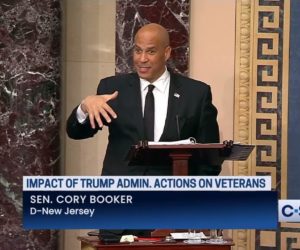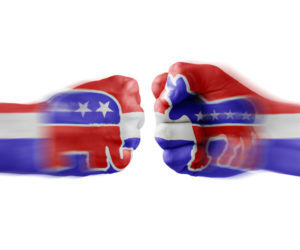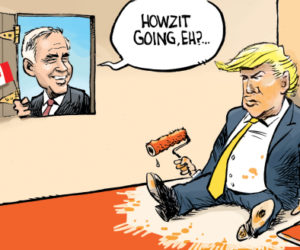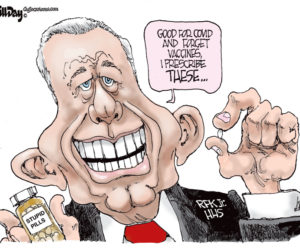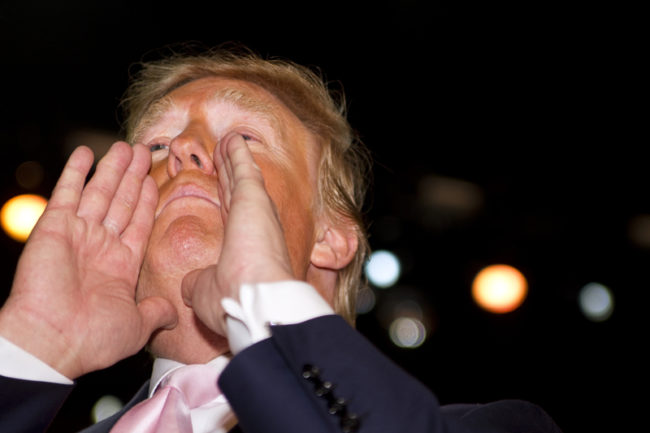
by Noah Jenkins
If the average American were asked about the Nixon and Clinton presidencies, the overwhelming majority would be more likely to recall the Watergate scandal, as opposed to Nixon’s fruitful work on Chinese relations, and the Lewinsky affair, instead of the federal budget surplus America saw under Clinton. It would not matter all four events had a significant impact on the country, merely because people have the propensity to remember negative, shocking, and disturbing times over mundane or even equally important ones—just like Vietnam overshadowed President Johnson’s work on civil rights.
This effect exacerbates a departing president’s greatest worry: their legacy, prompting many to tread carefully in their final days as to leave the best impression salvageable upon the nation.
For some reason, recently departed President Trump either was not concerned by this phenomenon or did not understand it, as his actions since his defeat in November dropped his relatively stable approval ratings down to their lowest. By now, of course, we know Trump was not a typical president and, by extension, did not think along the same strategic lines that have been more or less followed by his predecessors for decades.
I explored this idea in the last piece I wrote, The Future of Trumpism. As a brief run-down, I posited Trump was not primarily driven by a set of ideological principles that animated his political career, rather his instincts which, in some cases, served in lieu of principles themselves. The key flaw with this instinctual thinking, however, is that it can be irrational and seem to follow no pattern. We have seen this in many of his rallies, where after a certain point he tends to just say things that rile the crowd into a frenzy instead of “staying on message.” Perhaps, more famously, it was seen in his use of Twitter—something his supporters and opponents criticized alike.
It is here where the problem began.
For the first time the president had a direct line to the world. No middlemen to make him think twice. No press secretaries to tailor his words. Just Trump, his thoughts, and the send button. Paired with instinctual behavior, the result is a president firing tweets left and right, almost as if the platform is his notepad of ideas—some of which, obliviously, being bad and others innocuous. In terms of legacy, Twitter was a missed opportunity.
While Trump’s use of the platform created what I am sure was a never-ending PR nightmare in the White House Communications Office, his direct outreach to the people in that way was a large reason for his success in 2016 and continued connection with his base and many Americans thereafter. The people who went on to support him, for the most part, were tired of hearing official talking points and double-speak they had come to know in past administrations and just wanted to have a candidate that they knew was being transparent in his beliefs. Twitter was the perfect vessel for Trump to demonstrate this to his voters, and he will surely go down in future political science textbooks for revolutionizing the art of communicating with the people.
Regardless, the effect of negativity bias—whether we like it or not—will probably mean Trump’s rhetoric as a whole will go down as a net negative when all is said and done. Even while writing this I feel hard-pressed to think of examples that existed of positive or simply neutral tweets over the fiery, angry ones, despite me knowing more standard-issue tweets, that would have served well to underscore the idea laid out earlier on an optimal Twitter legacy.
One constant I noticed throughout the life of Trump’s Twitter account was how it mapped his emotions. When he was happy, we saw tweets that read happier. When he was annoyed, we definitely could tell through the language used. And when he was panicked, what played out over the last few months ensued.
The November election was the first time Trump was seriously situated to lose his power since he was inaugurated in 2017. Yes, the first impeachment just over a year ago was a clear threat but it was obvious to all he was not going to be convicted by the Senate. To put it another way, up to the election the former president had the office and the promise of potentially keeping that office for a little while longer. After November 7, and truly on December 14 not only was this promise was completely taken away, but he had lost.
President Trump knew he had failed, was going to lose power, and panicked. And while I am sure President Bush (41), Carter, and Ford had felt similarly, what they did not have was a direct line from their minds to the American public allied with little impulse control. Thus we saw the unraveling of a president rejected, and this unraveling did not manifest well.
Rather than waving a white flag and reacting similarly to his response to the lackluster support at his Tulsa rally last June—the one where the famous downtrodden image of him was taken as he came off Marine One upon his return—he doubled down, taking a line from a couple of speeches he made, about the election being rigged if he were to lose, pumping the narrative of a rigged election through his Twitter feed and other outlets. Did he believe this?
Perhaps in the early days, but less so as time went on. Unlike what many say, I do not believe Trump is completely clueless. His style is not the most organized or refined but it is hard not to admit, at face value, it took a certain level of genius to go from being a nobody in political spheres to being elected president of the United States in under a year and a half. This idea, on the other hand, goes back to the unique emotional and mental state of Trump after the election: he was in denial. Just as a griever, not believing their loved one died, may try to illogically chase after them as the casket lowers into the grave, Trump metaphorically exhibited the same cognitive dissonance: shrouded in grief, he chased his presidency that was going down.
The key issue in terms of legacy comes when the former officeholder is seen as problematic, not only by a political faction for political reasons but by the population at-large for a purpose transcending politics. This is the common denominator that can be derived from what we saw in the last couple of months from Trump and examples of moments that tarnished other presidents’ legacies. The president’s conduct superseded the power of partisanship and directly violated or, at least, came to a head with something within the core values most Americans share.
For Trump, his “legacy killer” expressed itself as an explicit affront to the constitution.
To be fair to Trump, there were some election irregularities, more so than in years past most likely as a side-effect to changes made to voting procedures to accommodate the challenges the pandemic presented. Additionally, some state election procedures were problematic. Despite this, there existed no evidence great enough to uphold the claims the Trump team was making nor to uphold their demands. This point is not an opinion or even a way to argue a statistic. When the Trump team filed lawsuits and went to court—their chance to showcase the evidence they allegedly had—they did not.
With this said, the breaking point for Trump with the public had not been reached yet. All the challenges still operated within the strictures of the constitution as the electoral college had not met yet and issues they had could still be raised at the state level where certification was still, theoretically speaking, an open question. A part of me, thought the electoral challenges, although a nuisance, had the upside of showing the constitutional process at work.
Then December 14 came.
All the Trump lawsuits had failed, and the states’ respective electors had voted just as had been projected by the end of election week. Trump promised to concede then, as after this point any challenge would be unconstitutional in spirit, but he continued beating the drum, and the country—conservatives included—began to turn against him.
Then the Georgia runoffs came, and Trump campaigned for former Senators Loeffler and Perdue by continuing to peddle the idea that in Georgia specifically the election results were rigged against him. Once again, the president exhibited cognitive dissonance as he was—under his logic—encouraging people to vote in a system rigged against them. Continuing along that same line of reasoning, we would expect his supporters not to show up as strongly to the polls on January 6 as they did in November because it would effectively be a waste of their time. So it was no surprise when this exact scenario ensued.
Trump, who had already done enough damage to his legacy, shot himself in the foot again, now being part of the reason his party lost their last bastion of hope of holding any power for the next couple of years. In other words, if Democrats pass the reforms they have promised—which they have virtually no reason not to—I foresee many Republicans laying the blame at his feet.
I will not get too much into the storming of the Capitol that followed the next day, but despite whatever level of culpability you think Trump had on that event, as it relates to his legacy, this is the hard, concrete event that can make his legacy irreparable. With this said, the arguable good that has resulted from the Trump Administration—the good that will be overshadowed—ought not to be forgotten. Among many, many things, the former president brokered the Abraham Accords between the U.A.E., Bahrain, and Israel—an accomplishment so great many claimed it deserved a Nobel prize—and presided over an economy record-breaking in many categories.
Remembering this simply emphasizes what Trump just dealt himself out of. Besides a legacy, he was also in the position of being a relatively popular one-term president in his party—that is, before the chaos ensued. Thus, his supposed 2024 run could have more viable.
The meaning of all this? The same impulsivity that drove him to his heights also ruined him forever. Perhaps that will be the greatest legacy he leaves behind.
Photo 14374905 © Danny Raustadt – Dreamstime.com

